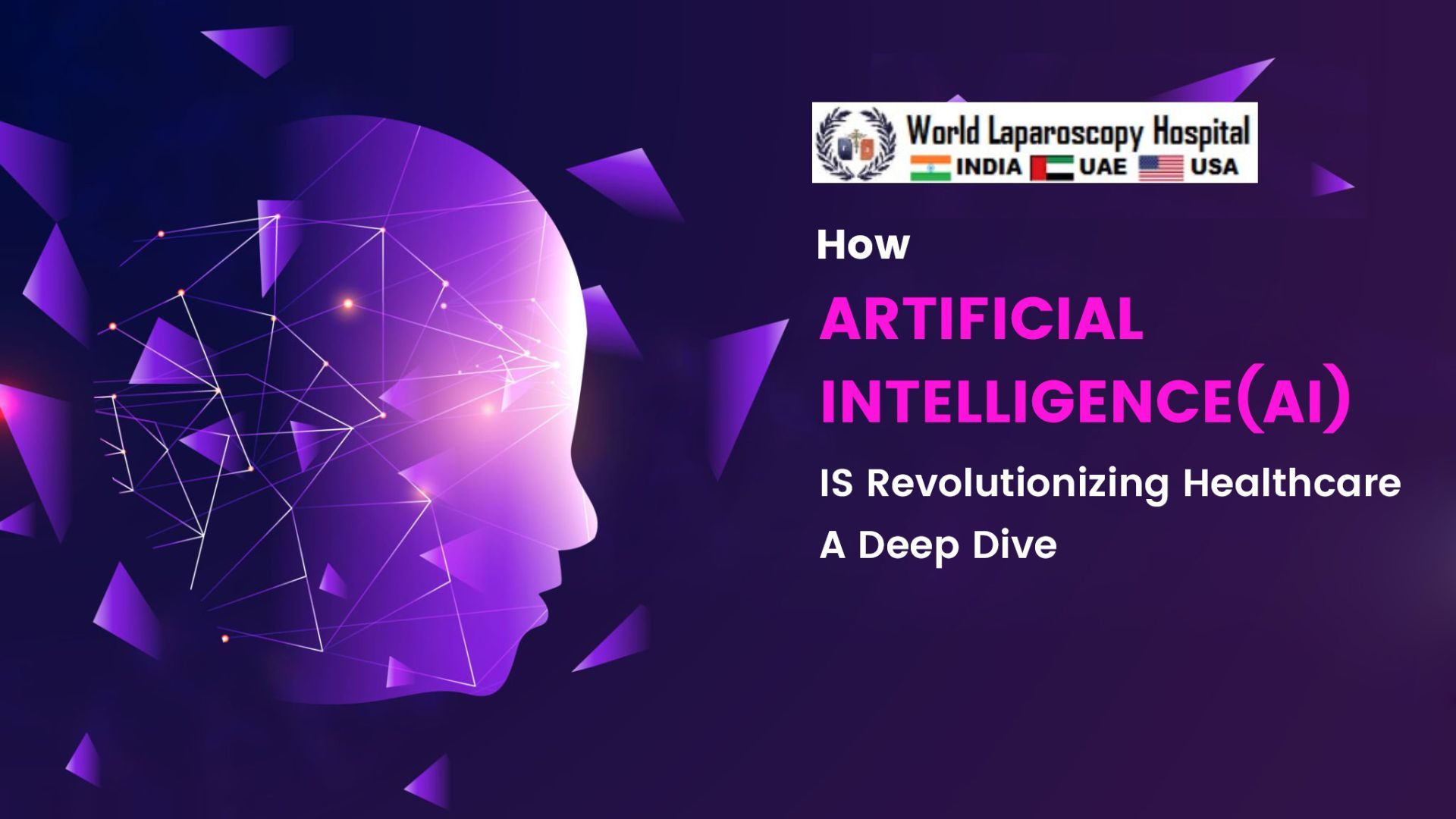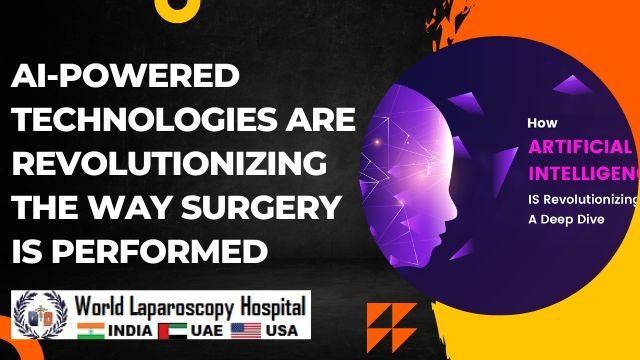AI-powered technologies are revolutionizing the way surgery is performed
Artificial intelligence (AI) is rapidly transforming the healthcare industry, and surgery is no exception. AI-powered technologies are already being used to improve surgical planning, decision-making, and execution, and they have the potential to revolutionize the way surgery is performed.
One of the most promising applications of AI in surgery is in the area of preoperative planning. AI-powered software can be used to analyze medical images, such as CT scans and MRIs, to create detailed 3D models of the patient's anatomy. This information can then be used to help surgeons plan the surgery in advance, identify potential risks, and select the best surgical approach.

For example, AI-powered software has been used to help surgeons plan complex brain surgeries. By creating a 3D model of the patient's brain, surgeons can visualize the tumor and surrounding tissue in great detail. This information can then be used to develop a personalized surgical plan that minimizes the risk of damage to healthy tissue.
AI is also being used to improve surgical decision-making during the operation. AI-powered systems can be used to monitor the patient's vital signs and provide real-time feedback to the surgeon. This information can help surgeons to make quick and informed decisions during the surgery, which can lead to better outcomes for patients.
For example, AI-powered systems have been used to help surgeons manage bleeding during surgery. By monitoring the patient's blood loss in real-time, AI systems can alert surgeons to potential problems before they become serious. This information can help surgeons to take corrective action quickly, which can prevent serious complications.
In addition to preoperative planning and intraoperative decision-making, AI is also being used to improve the execution of surgery. AI-powered robots are being developed that can perform surgery with greater precision and accuracy than human surgeons. These robots can also be used to access difficult-to-reach areas of the body, which can make surgery safer and more effective.
For example, AI-powered robots have been used to perform minimally invasive surgery. This type of surgery involves making small incisions in the body, which can lead to faster recovery times and less pain for patients. AI-powered robots can make minimally invasive surgery even more precise and effective, which can lead to even better outcomes for patients.
The use of AI in surgery is still in its early stages, but it has the potential to revolutionize the way surgery is performed. AI-powered technologies can help surgeons to improve preoperative planning, intraoperative decision-making, and the execution of surgery. This can lead to better outcomes for patients, including shorter recovery times, less pain, and lower risk of complications.
In addition to the benefits listed above, AI in surgery also has the potential to:
Improved preoperative planning
AI-powered software can be used to analyze medical images, such as CT scans and MRIs, to create detailed 3D models of the patient's anatomy. This information can then be used to help surgeons plan the surgery in advance, identify potential risks, and select the best surgical approach.
For example, AI-powered software has been used to help surgeons plan complex brain surgeries. By creating a 3D model of the patient's brain, surgeons can visualize the tumor and surrounding tissue in great detail. This information can then be used to develop a personalized surgical plan that minimizes the risk of damage to healthy tissue.
Improved intraoperative decision-making
AI-powered systems can be used to monitor the patient's vital signs and provide real-time feedback to the surgeon. This information can help surgeons to make quick and informed decisions during the surgery, which can lead to better outcomes for patients.
For example, AI-powered systems have been used to help surgeons manage bleeding during surgery. By monitoring the patient's blood loss in real-time, AI systems can alert surgeons to potential problems before they become serious. This information can help surgeons to take corrective action quickly, which can prevent serious complications.
Improved execution of surgery
AI-powered robots are being developed that can perform surgery with greater precision and accuracy than human surgeons. These robots can also be used to access difficult-to-reach areas of the body, which can make surgery safer and more effective.
For example, AI-powered robots have been used to perform minimally invasive surgery. This type of surgery involves making small incisions in the body, which can lead to faster recovery times and less pain for patients. AI-powered robots can make minimally invasive surgery even more precise and effective, which can lead to even better outcomes for patients.
Improved access to surgery
AI-powered technologies can make surgery more affordable and accessible to patients in rural or underserved areas. This is because AI can be used to automate tasks that are currently performed by human surgeons, which can reduce the cost of surgery. Additionally, AI can be used to provide remote surgery, which can allow patients in rural areas to access the care they need without having to travel long distances.
Reduced surgical errors
AI can help surgeons to identify and avoid potential errors during surgery. This is because AI can analyze large amounts of data to identify patterns that human surgeons may miss. Additionally, AI can be used to create simulations of surgery, which can help surgeons to practice and refine their skills before performing surgery on a real patient.
Improved patient satisfaction
AI can help to create a more personalized and patient-centered surgical experience. This is because AI can be used to collect data about the patient's medical history, preferences, and goals. This information can then be used to create a personalized surgical plan that is tailored to the individual patient.
Overall, AI has the potential to make surgery safer, more effective, and more accessible for patients. As AI technology continues to develop, it is likely that we will see even more benefits from its use in surgery.
Top
One of the most promising applications of AI in surgery is in the area of preoperative planning. AI-powered software can be used to analyze medical images, such as CT scans and MRIs, to create detailed 3D models of the patient's anatomy. This information can then be used to help surgeons plan the surgery in advance, identify potential risks, and select the best surgical approach.

For example, AI-powered software has been used to help surgeons plan complex brain surgeries. By creating a 3D model of the patient's brain, surgeons can visualize the tumor and surrounding tissue in great detail. This information can then be used to develop a personalized surgical plan that minimizes the risk of damage to healthy tissue.
AI is also being used to improve surgical decision-making during the operation. AI-powered systems can be used to monitor the patient's vital signs and provide real-time feedback to the surgeon. This information can help surgeons to make quick and informed decisions during the surgery, which can lead to better outcomes for patients.
For example, AI-powered systems have been used to help surgeons manage bleeding during surgery. By monitoring the patient's blood loss in real-time, AI systems can alert surgeons to potential problems before they become serious. This information can help surgeons to take corrective action quickly, which can prevent serious complications.
In addition to preoperative planning and intraoperative decision-making, AI is also being used to improve the execution of surgery. AI-powered robots are being developed that can perform surgery with greater precision and accuracy than human surgeons. These robots can also be used to access difficult-to-reach areas of the body, which can make surgery safer and more effective.
For example, AI-powered robots have been used to perform minimally invasive surgery. This type of surgery involves making small incisions in the body, which can lead to faster recovery times and less pain for patients. AI-powered robots can make minimally invasive surgery even more precise and effective, which can lead to even better outcomes for patients.
The use of AI in surgery is still in its early stages, but it has the potential to revolutionize the way surgery is performed. AI-powered technologies can help surgeons to improve preoperative planning, intraoperative decision-making, and the execution of surgery. This can lead to better outcomes for patients, including shorter recovery times, less pain, and lower risk of complications.
In addition to the benefits listed above, AI in surgery also has the potential to:
- Improve access to surgery: AI-powered technologies can make surgery more affordable and accessible to patients in rural or underserved areas.
- Reduce surgical errors: AI can help surgeons to identify and avoid potential errors during surgery.
- Improve patient satisfaction: AI can help to create a more personalized and patient-centered surgical experience.
Improved preoperative planning
AI-powered software can be used to analyze medical images, such as CT scans and MRIs, to create detailed 3D models of the patient's anatomy. This information can then be used to help surgeons plan the surgery in advance, identify potential risks, and select the best surgical approach.
For example, AI-powered software has been used to help surgeons plan complex brain surgeries. By creating a 3D model of the patient's brain, surgeons can visualize the tumor and surrounding tissue in great detail. This information can then be used to develop a personalized surgical plan that minimizes the risk of damage to healthy tissue.
Improved intraoperative decision-making
AI-powered systems can be used to monitor the patient's vital signs and provide real-time feedback to the surgeon. This information can help surgeons to make quick and informed decisions during the surgery, which can lead to better outcomes for patients.
For example, AI-powered systems have been used to help surgeons manage bleeding during surgery. By monitoring the patient's blood loss in real-time, AI systems can alert surgeons to potential problems before they become serious. This information can help surgeons to take corrective action quickly, which can prevent serious complications.
Improved execution of surgery
AI-powered robots are being developed that can perform surgery with greater precision and accuracy than human surgeons. These robots can also be used to access difficult-to-reach areas of the body, which can make surgery safer and more effective.
For example, AI-powered robots have been used to perform minimally invasive surgery. This type of surgery involves making small incisions in the body, which can lead to faster recovery times and less pain for patients. AI-powered robots can make minimally invasive surgery even more precise and effective, which can lead to even better outcomes for patients.
Improved access to surgery
AI-powered technologies can make surgery more affordable and accessible to patients in rural or underserved areas. This is because AI can be used to automate tasks that are currently performed by human surgeons, which can reduce the cost of surgery. Additionally, AI can be used to provide remote surgery, which can allow patients in rural areas to access the care they need without having to travel long distances.
Reduced surgical errors
AI can help surgeons to identify and avoid potential errors during surgery. This is because AI can analyze large amounts of data to identify patterns that human surgeons may miss. Additionally, AI can be used to create simulations of surgery, which can help surgeons to practice and refine their skills before performing surgery on a real patient.
Improved patient satisfaction
AI can help to create a more personalized and patient-centered surgical experience. This is because AI can be used to collect data about the patient's medical history, preferences, and goals. This information can then be used to create a personalized surgical plan that is tailored to the individual patient.
Overall, AI has the potential to make surgery safer, more effective, and more accessible for patients. As AI technology continues to develop, it is likely that we will see even more benefits from its use in surgery.






